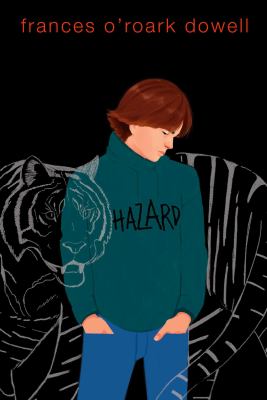Hazard
by Frances O'Roark Dowell
A boy with anger issues and his struggling veteran father reckon with what they've done and find the path to healing in this unflinching middle grade novel in verse about love and forgiveness.
Hazard is a military kid best known for his prowess at football and his short fuse. Lately, Hazard has been worried about his dad, who's in Afghanistan on his third tour, and feeling the pressure to be a good son in his absence, and a good player for the team counting on him. But when it gets to be too much Hazard can no longer keep his cool, he blows up.
The aftermath sees him benched for six games and forced to go to therapy. He and his dad both end up at Walter Reed Medical Center, where Hazard is trying to fix his hotheaded attitude and his dad is learning to walk with a prosthetic. Only, that's not the worst damage his dad is dealing with. What he did on the battleground--the things he may never be able to forgive himself for--is a moral injury, the kind that burrows into someone's brain and keeps them from coming back from war no matter where they are physically.
As part of Hazard's therapy, he has to trace back the causes of his anger through letters, emails, and texts and see the links to his father's journey, their shared legacy of toxic coping mechanisms and hidden pain. If Hazard can come to terms with what he's done, maybe he can help his father, too.
Hazard is a military kid best known for his prowess at football and his short fuse. Lately, Hazard has been worried about his dad, who's in Afghanistan on his third tour, and feeling the pressure to be a good son in his absence, and a good player for the team counting on him. But when it gets to be too much Hazard can no longer keep his cool, he blows up.
The aftermath sees him benched for six games and forced to go to therapy. He and his dad both end up at Walter Reed Medical Center, where Hazard is trying to fix his hotheaded attitude and his dad is learning to walk with a prosthetic. Only, that's not the worst damage his dad is dealing with. What he did on the battleground--the things he may never be able to forgive himself for--is a moral injury, the kind that burrows into someone's brain and keeps them from coming back from war no matter where they are physically.
As part of Hazard's therapy, he has to trace back the causes of his anger through letters, emails, and texts and see the links to his father's journey, their shared legacy of toxic coping mechanisms and hidden pain. If Hazard can come to terms with what he's done, maybe he can help his father, too.
Have you read this book? Join now to add book to your completed list.
